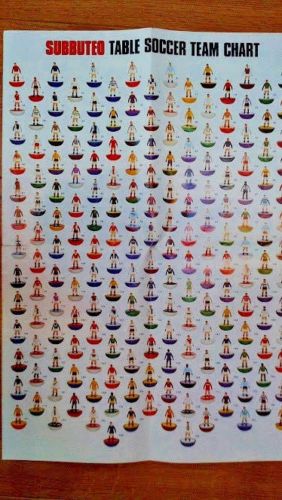A beloved heritage brand with decades of history slowly being eroded by strange decision making and commercial selling out? We know all about that here on the site formerly known as Subbuteo.Online.
As the FA and Premier League conspire the destroy the world’s best domestic cup competition so that a cartel of clubs can jet across the planet playing money-spinning friendlies it got us thinking about the sheer scale of the own goal taking place over at FA headquarters.
Strangely, it does seem to have some parallels to the decline in Subbuteo over the years. And while Subbuteo has done good things in recent months, the 2000s were a time when Hasbro seemed to make enough mistakes to sink the brand for good. While there are recent green shots, we couldn’t help but think of the recent FA Cup replays debacle as an interesting parallel to Subbuteo two decades ago.
So with that in mind I have put together a quick guide to how to ruin your beloved heritage brand courtesy of Subbuteo and the FA.
Ditch your main selling point
There is a simple reason why Subbuteo is one of the most marketable brands in football. Even if you never got your pitch ironed enough to have a flick around you could collect the teams.
Each team, lovingly hand-painted and placed in the iconic green box, had a reference number. These appeared on the famous posters and were drooled over by children across the world for decades. The numbers could represent a single team or multiple. A reference 011 team with its black and white stripes could be Newcastle, Juventus, Notts County or Besiktas, for example.
The beauty was in the simplicity. There was a list of numbers to collect and you could pick your favourite, from obscure teams from around the world to Liverpool and Manchester United. Catalogues showcased the newest teams and shop displays had those beautiful boxes stacked to the ceiling.
When Hasbro decided to relaunch Subbuteo in the early 2000s in a last attempt to revive the dying brand, it dropped them altogether. No more beautifully design posters, no more catalogues and no more reference numbers for teams. Instead the cartoon-y boxes simply said ‘red team’, ‘blue team’ and ‘black and white team’. The charm, the uniqueness and the beautiful simplicity of Subbuteo was dead.
Over in the big brains of the FA execs, a similar loss of identity was taking place. A drastic overspend on the soulless ‘new Wembley’ meant semi-finals were shifted from an eclectic mix of stadiums to Wembley itself, instantly diluting the prestige and the magic of reaching a final.
Famous songs depicting a fanbase ‘going to Wembley’ were defunct. The allure of playing at the nation’s stadium was achievable for anybody reaching a semi final. The magic was dead and the prestige of reaching the final was watered down. Hard-hit fans needed to fork out for two trips in a month, often with trains not laid on for late returns.

Ruin your marketing
Ask any marketer this simple question. They’re pretty easy to spot. You can find them in your local independent coffee shop hunched over their Macbook.
What is the easiest type of brand to market?
The answer is a much-loved heritage brand. The era of nostalgia is upon us and people love old football stuff. There isn’t a delivery man on the planet who can resist commenting on our wall of Subbuteo memorabilia. COVID lockdown led to a an avalanche of emails to our inbox as people rediscovered Subbuteo.
Subbuteo featured in last year’s Champions League Final. We were even contacted by the team marketing the FA Cup final one year who wanted a scale Wembley model to use for the final.
People love Subbuteo. And they still messed it up. I’ve gone into that in more detail here but in short, Subbuteo is not marketed at all. The brand which brought you the famous team poster and the instantly recognisable silhouette is now resigned to appearing on supermarket tournament clothes from brands who have paid £50,000 a pop to secure the license for their tat. There is no quality control, no premium feel to the brand anymore. And that is part of the reason why very few people care about it anymore, despite loving what it stands for.
People love the FA Cup too. It’s probably the most beloved cup competition in the world. But gone are the days of day-long coverage for the final. There are no awkward interviews where we find out what John Stones has for breakfast. There are no cup final songs. They don’t even stop games taking place on the same day and kickoff doesn’t always take place at the traditional 3pm slot anymore.
We see it. We see the brand being devalued. We see the occasion being relegated in importance year on year. The FA Cup becoming an afterthought, an asterisk on a season whose success hinges on finishing fourth in the league. Treat something as pointless and it quickly becomes pointless. Just ask anybody involved in the sales team at Subbuteo in the last 20 years.
In fact, stop including some clubs entirely
Subbuteo basically wiped every single club off its product list with the relaunch and the move to generic teams. In an era when children were increasingly chasing licenses to replicate the success of their favourite teams, the loss of these licenses signalled the end of Subbuteo as a major player.
However, it only took one club to completely derail the FA Cup as a serious competition. Step forward Manchester United, who decided they did not want or need to defend their title in 2000 and promptly withdrew from the FA Cup to go and get embarrassed in a nondescript ‘World Club’ tournament in South America.
It could be argued the FA Cup has never really recovered.
Let Budweiser get involved
Around the time Subbuteo’s quality plummeted the brand teamed up with slightly alcoholic fizzy drink brand Budweiser to launch a low quality five a side set, a strange move for a brand once played by six million children.
The set is not even close to the standards of the beautiful Football Express five-a-side Subbuteo launched in the brand’s heyday. Cheap, tacky and a clear corporate sell-out, it was a sign of the alarming decline in what was once the world’s most popular football game.

Surely the FA Cup would not do similar? Well, it did. Sponsored by Budweiser for a number of years, it decided to make a mockery of the hundreds of non-league teams who compete each year by allowing Budweiser to take over Wembley FC, register a host of has-been footballers, and actually pick the team for that year’s FA Cup run.
A Terry Venables-managed side featuring Martin Keown, Graeme Le Saux and Claudio Caniggia was entered into the tournament, much to the disappointment of fellow non-league sides.
Wembley were knocked out in the preliminary qualifying round and Budweiser sloped off. A new badge was produced too and while Budweiser signed over the trademark after dropping the club, Wembley stadium’s company later took legal action to ban the club from using it because it contained the word Wembley, leaving the club financially ruined.
Chairman at the time Brian Gumm said: “As far as I’m concerned, the FA think that we are a little club, so we shouldn’t have trademarks and that we’re not going to get anything from them. They should be trying to look after us, not fight us.”
The magic of the cup eh?
